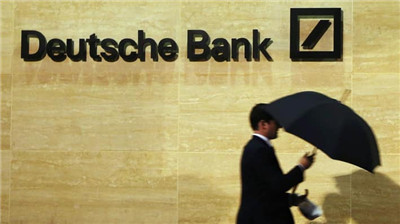(单词翻译:单击)
Do the almost simultaneous announcements this month of a new regime at Deutsche Bank, and an extensive restructuring at HSBC, symbolise a fundamental change in the structure of financial companies?
本月几乎同时宣布的德意志银行(Deutsche Bank,见上图)领导层换血以及汇丰(HSBC)全面重组,将代表金融公司结构的根本性变化吗?
The last two decades of the 20th century saw the rise of integrated financial conglomerates. In Britain, the trigger was the Big Bang in 1986. In the US, the separation of investment and commercial banking imposed in the 1930s by the Glass-Steagall Act was steadily eroded. The universal banks of continental Europe, seeing these trends, reinvented themselves along Anglo-Saxon lines.
20世纪最后20年见证了综合性金融集团的崛起。在英国,导火索是1986年发生的“金融大爆炸”(Big Bang)。在美国,《格拉斯-斯蒂格尔法案》(Glass-Steagall Act)上世纪30年代规定的投资银行与商业银行业务分业经营被逐步破坏。看到这些趋势的欧洲大陆的全能型银行,也沿着盎格鲁-撒克逊道路对自身进行了彻底改造。

In Britain, the very large financial resources of retail banks meant that they were initially dominant operators, absorbing the partnerships that had dominated stockbroking, market making and investment banking. Few of these acquisitions worked out well. Stockbrokers, jobbers and corporate dealmakers did not much enjoy the culture of the retail bank. Many former partners in these firms, made very wealthy through the sale of their businesses, preferred to spend more time with their families. The revenue earners below, deprived of the opportunity to enjoy the icing on the cake, were unhappily nicknamed the “marzipan layer”.
在英国,零售银行庞大的金融资源意味着它们一开始就成为主导经营者,吸收那些曾经主导股票经纪、做市和投行业务的合作伙伴。但这些收购很少有成功的。股票经纪商、股票自营商和企业交易撮合者并不喜欢零售银行的文化。这些公司之前的很多合伙人通过出售自己的业务变得很富有,他们更喜欢多花时间陪伴家人。而他们以下那些被剥夺分享额外收益机会的收入人群,不幸地被称为“杏仁软糖层”(指企业最高管理层之下的那个管理层级——译者注)。
Despite these initial failures, dealmaking continued apace. In 1998–9 Sandy Weill created Citigroup, largest of all financial conglomerates. Mr Weill led the charge to secure the final repeal of Glass-Steagall, and ejected his co-chief executive John Reed, a career retail banker in traditional mould.
虽然最初遭遇失败,但并购交易持续加速。1998至1999年期间,桑迪•威尔(Sandy Weill)创建了所有金融集团中规模最大的花旗集团(Citigroup)。在威尔带头的攻势下,《格拉斯-斯蒂格尔法案》最终被废除,他还赶走了花旗联合首席执行官约翰•里德(John Reed),后者是一位坚持传统的职业零售银行家。
The balance of power within financial conglomerates had changed. Dealmakers, greedier and smarter, took control. In investment banks the traders, rather than the corporate suits, were in charge. Trading was believed to be the major source of profits, and power followed. The fears of the marzipan layer were dispelled by the large bonuses they received as part of these big corporate organisations. But Mr Weill’s triumph was the crest of the wave. Reputational issues began to dog his creation.
金融集团内部的权力平衡已经发生变化。更贪婪、更精明的交易撮合者获得控制权。在投行,交易员(而非高级管理人员)说了算。交易被认为是主要的利润来源,其次才是权力。“杏仁软糖层”的忧虑被他们收到的巨额奖金所驱散,奖金是这些大企业组织的一部分。但威尔的胜利是这一切的顶峰。声誉问题随后开始困扰他创建的花旗集团。
The culture of retail banking — intrinsically bureaucratic, perhaps boring, driven by the routinisation needed to allow the accurate completion of millions of transactions every day — was incompatible with the entrepreneurial, buccaneering environment of the investment bank. The association provided opportunities for cross-selling. Informational advantages were derived from engaging in multiple roles. But the main logic was financial: the cross subsidy made possible by a passive deposit base guaranteed by the taxpayer.
零售银行业的文化本质上有着官僚作风,或许还有点单调,受保证每日数百万笔交易精确完成所必需的程序化所驱使,这与投行冒险、投机的氛围格格不入。它们的结合提供了交叉销售的机会。同时从事多种业务带来信息上的优势。但混业的主要理由是财务上的:由纳税人担保的无息存款基础使交叉补贴成为可能。
While these apparent synergies might yield private advantage for banks, this was offset — generally more than offset — by the costs to customers and taxpayers. This downside would become all too apparent as mis-selling and conflicts of interest were exposed, and taxpayer support was demanded. Within a decade Citigroup had to be bailed out.
虽然这些表面上的协同效应可能为银行带来秘密优势,但这被对消费者和纳税人造成的损失所抵消(通常不止抵消)。这种负面效应会随着不当销售和利益冲突的暴露而变得十分明显,随后就会需要纳税人的支持。不到10年,花旗就不得不接受纾困。
But there was little immediate change. When the music stopped for Chuck Prince at Citigroup, investment banker Vikram Pandit took his place. The elevation of Bob Diamond to the chief executive slot at Barclays and of Anshu Jain to the same position at Deutsche Bank was yet to come.
但变化没有立即发生。当音乐不再为花旗前首席执行官查克•普林斯(Chuck Prince)奏响,投资银行家潘伟迪(Vikram Pandit)接替了他的位置。再后来,鲍勃•戴蒙德(Bob Diamond)与安舒•贾恩(Anshu Jain)分别被提升为巴克莱(Barclays)与德银的首席执行官。
And yet, seven years later, it seems that change may be beginning. The respected central banker, Axel Weber, went to UBS to slim down its investment banking activities. When Mr Diamond was fired from Barclays, and Mr Pandit from Citigroup, they were replaced by institutional lifers with experience of traditional banking. Now Mr Jain has lost his post at Deutsche Bank. HSBC has told shareholders that, ahead of government-imposed ring fencing of its UK retail banking operations, it will rebrand these activities; it may not be long before they are hived off.
然而,7年后,变化似乎正在开始发生。受人尊敬的德国央行(Bundesbank)前行长埃克塞尔•韦伯(Axel Weber)来到瑞银,为其投行业务瘦身。当戴蒙德和潘伟迪分别被巴克莱和花旗解雇后,他们被拥有传统银行业经验的恪守制度的专业人士所取代。如今,贾恩已不再担任德银首席执行官。汇丰银行告诉股东,在政府对其英国零售银行业务实施圈护之前,将重塑这些业务;它们可能不久就会被分离出来。
Perhaps, not before time, boring banking is starting to make a comeback.
也许用不了多久,单调的银行业务就会卷土重来。


